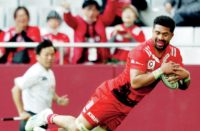 Come on Stuart, show us what you've done with this team of yours. I know it's not even a year since Stuart Lancaster took over as interim coach, but we need a sign. Lancaster, now head coach, has without doubt got the English rugby public believing in the team again after it seemed players had forgotten what it means to play for your country. He's grounded them, made the squad interact with everyday people, held open sessions and taken them back to grassroots. It is all very good – but what about the playing and the winning of international matches?
Come on Stuart, show us what you've done with this team of yours. I know it's not even a year since Stuart Lancaster took over as interim coach, but we need a sign. Lancaster, now head coach, has without doubt got the English rugby public believing in the team again after it seemed players had forgotten what it means to play for your country. He's grounded them, made the squad interact with everyday people, held open sessions and taken them back to grassroots. It is all very good – but what about the playing and the winning of international matches?
In general, I like the squad Lancaster has put together, although I would have included Steffon Armitage and Freddie Burns because their form demands selection. However, the time has come for this England team to start showing signs of working out how and where to attack. I was slightly disappointed when I heard Lancaster say it was easier to defend than it was to attack. Who did he ask? Ask Danny Cipriani or Freddie Burns, or Quade Cooper, and you'd get a different answer.
If Lancaster believes it's harder to attack then the team should be working harder on that than any other aspect of their game. Set-piece and defence is routine, but practising attack has to be played out in many different scenarios. In one sense it's similar to defence, because when you commit to tackle you do so knowing your inside is covered. When you make a break in attack you should also do so knowing there is at least one other player behind you in support. I don't know why players find it hard to support. It is about reading what the players alongside them are going to do, and reacting.
To play the way Leinster, Harlequins, Clermont and the New Zealanders do, you take it for granted that top level players can do the basics very well – and that includes tackling someone running at you. For the Kiwis it's inbuilt because of excellent coaching at a young age, and it's no surprise or coincidence that Clermont, Leinster and Quins are influenced by Kiwis.
The art of attack is essentially keeping the ball long enough to create an opportunity to score. You dominate the defence, not the other way round. England have to start playing in parts like the teams mentioned above if they have any ambition of being a contender for the World Cup in 2015. However, it's worth understanding that Joe Schmidt's ambition when he became Leinster head coach was to make them the best passing team in Europe. He's succeeded, but it didn't happen overnight, even with all that talent.
The game against Fiji is as good a place as any to start showing what Mike Catt has been recruited as attack coach to bring out of these players. England could start with a backline of Danny Care, Toby Flood, Brad Barritt, Manu Tuilagi, Ugo Monye, Charlie Sharples and Mike Brown, and this could function quite adequately. You've got the ability of Care to get the ball away quickly, Flood standing flat and passing onto Barritt and Tuilagi to get over the gain-line. There's the speed of Sharples and Monye and the counter-attacking, big booted Brown at the back.
That's a blend of strength, speed and skill which should be enough to put away Fiji, providing they get good quick ball. In the first international of the season teams generally struggle to get going until the second half, and that's when we will see if England have been working on anything other than the set-piece.
I would love to see some strike moves from the England backline, because there's enough distraction and speed to create havoc. I hope they've got the guts to do it.
There are three key players, of whom Flood is the most important. It's his time, and he's experienced enough to know what he wants. I pray he's telling Catt and Lancaster how he aims to get his backs firing. That means telling his forwards to get out of the way of quick ball and get behind him on slow ball to bash the holes. Flood simply has to run the show, pointing, shouting, pulling and pushing players here and there, reminding them what's required. He needs to take these autumn internationals and show everyone he is the best, which means being brave and playing flat in the face of the defence with quick ball. That doesn't mean he has to do it every time he gets the ball – but, when it's on, it's got to be taken.
At the moment Barritt is likely to be picked at inside-centre with Tuilagi at outside-centre, but the best balance once Jonathan Joseph is injury-free is to have him at 13 outside Tuilagi. Barritt is playing well for Saracens and does his job well even though he likes the populated areas of the field, and seems almost agoraphobic, but he gets across the gain-line. Tuilagi is similar, but he likes the space more than the tight, especially where he can hand-off and go. Joseph is different because he makes defences think more about where and what he's going to do, and he also looks quicker than both Tuilagi and Barritt.
At the moment Tuilagi is England's X factor. If this kid wants to do it, he can. His size and explosive power means he's incredibly difficult to stop, because even though you might know where he's going you'd rather not be in his way. Catt has to bring all Tuilagi has to offer into the mix and coach him about what more he can do.
Care is in sparkling form for Quins, and the only way that can change is if he's asked to play differently, i.e. in a way he's not used to or happy with. So, he needs to be left to do what he does for his club, as in pass, run, support, break and reach the breakdowns quickly. Care must whip his forwards into delivering quick ball, and not spend time digging among players on the floor.
Lancaster's eight games in charge isn't a lot in this modern era. It's not enough to have produced a team capable of winning a Six Nations, a World Cup, or going on a long undefeated run, especially when you take into account that his coaching team, apart from Graham Rowntree, are also novices at this level.
England should always have forwards who are good at set piece, because it's in their blood. However, for Lancaster to get this team to compete with the best in the world he has to get his forwards to carry and off-load the ball, and to be dynamic and explosive in contact and at the breakdowns. The key to them linking with the three-quarters is producing quick ball, while the backs have to understand the dynamics of that quick ball and how to use it.
There have been wins over Australia a couple of times, and the victory over France earlier this year, but on each occasion the team weren't able to build and win back-to-back.
It all seems very simple, but we haven't seen any England team in recent years master those skills well enough to produce winning performances consistently.
One Comment
Leave a Comment
You must be logged in to post a comment.



























Flood’s decision making is poor. Shown again today when points were on offer. Too often he doesn’t step up when his team is on the back foot.
I’ve seen him play against Saracens three times in the last 18 months and each time he refused to take responsibility to get his team the win – leaving it to the forwards twice (losing the prem final, and then at Wembley recently) and the other time turning down a drop goal repeatedly, and so Geordan Murphy had to step up and take responsibility.
Good runner, good place kicker, poor leader in a key position.